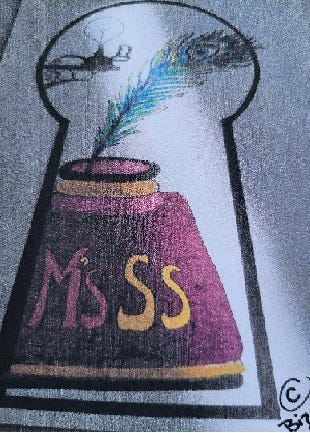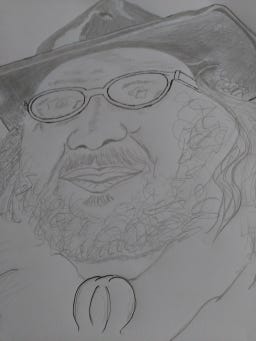"THE STONE" Part 1 of 2.
RANDOM STORY #3a
Collar weakly defying the chill Winter drizzle, Carforth turned away from the bus into the shabby cobbled street that ran downhill to a black-eyed, dark satanic, derelict mill. It’s crumbled walls loomed and leered at the sorrowful yellow stream fondling it’s foundations. Along the centre of the street, betwixt the paintless Pennine-stone sham-fours, lay the rusted rails of a narrow gauge, ending with two heat twisted bogeys fused to the iron gates. The street had been erected by the mill company to house immigrant workers, now long gone, as were parts of of the slums themselves.
Carforth’s Great-Grandfather had been a principle founder of the business, investing the vast fortune he’d made in colonial Africa. Early profits had gone into building most of the village, the directors mansions, and of course a church….. to appease the owner’s consciences. In it’s heyday over two thousand had toiled in the stench and gloom, whilst shareholders grew merrily fat, with lack of foresight enticing slow decline. Suddenly it was all over, ensured by the Great Fire. The mill’s debts were met in part by the insurance company, the rest by the forced sale of the housing stock. Most of which were snapped up by county landlords.
Grandfather Carforth had died in the fire, his will left some boxes of belonging with just enough cash for a nephew to afford one such bargain price home. One of just a very few families that owned their own houses. Thus unburdened by rent he managed to raise two sons, whilst the village endured a slow exodus. His lads attained school leaving age in 1911, facing little prospect of local work. Three years of odd jobs until the outbreak of world war, led them, lying about their age, to enlist in the local “Pals” regiment. Their father, had already found a job in a Sheffield armaments factory, rendering him exempt from the call up.
The war having passed, on return they found their mother sick with Grief - Dad had been killed in a drunken fall at the Victory Day celebrations. The boys safe homecoming did not lift her, before their bewildered gaze she wasted to death within weeks. They laid her to rest at Dad’s side. They held no wake.
Walking home from the grave, Ned, the younger, more ebullient, announced to his white faced companion that he wanted to seek work in Birmingham. “Ahv met this lorry drahver tha’sees, an’ eel gi’us a lift, only ‘es off ternight, like. ‘E can squeeze both on us in….. Why ! Colonel Baguley lives in Brum, than us, ah reckon ‘e cud fahnd us summat, like…..” The elder brother didn’t reply for some time.
They walked in silence, Ned looking silently sideways on. Rounding their corner, they stopped. “Nay, ah think as ahl stick aboot a bit” He gestured toward the blackened ruin, about to speak again, but merely shrugged. He had wanted to say something about roots, heritage, belonging, and about somehow, Some Bloody How… reopening the mill. Feeling daft he started walking again.
Once inside, he put the kettle on, boiling with it, seething with an inner confusion. “Aye, reet then” ventured Ned, perplexed, uncomfortable “Ah’d best be packin’ me bits, like….” Later, drinking silent teas - they’d never communicated much - wimim talked - men worked; Carforth searched futilely for a way to convey his dreams, Ned apprehensive of `summats up` fidgeted all the while “Eh, gi’ us a last cuppa” His brother sighed, nodded, resigned. One short embarrassed handshake, and Ned closed the front door very quietly.
There was a shortage of eligible young men, not so many of the “Pals” regiments had survived the intense European slaughter. Carforth managed to find work as a clerk to a Huddersfield Ironmonger. Post war trade was brisk, thanks to rebuilding Britain. His bosses’ daughter wooed and coaxed Carforth into wedlock. Four years on, the fun was drifting into dull routine. One morning a pile of empty crates collapsed sending our hapless Carforth senseless to the floor. His Boss drove him to the hospital, thankful for a diagnosis of “No Serious Harm”, slipped Carforth a florin for his busfare home with a pint or two “Tek rester day off, Lad, ‘appen itser good job there wus nowt ‘evvey in yon ctates, Eh !?”
Sore and stiff he came into his home to discover his wife near naked in the arms of a stranger, who cursed and ran. She hurriedly pulled on her dress. They stood long, staring at each other, until, finally, his bandaged head and hand registered “OH !! what have you Done ?” “Me ? ME !! That’s a Bloody good laff innit !?” He pushed past, ascended the stairs, cried himself to sleep. During the quiet evening, he came trembling down. She’d gone, taking only the jar of meter coins, her hat, her coat. Shaken hard, he was unable to face returning to work. Some days on, her father stood at the door “Where the ‘eckers is our Mavis ?!”
Days of hostilities ensued including two police visits, the first an enquiry into the mysterious disappearance - the second, without apology to inform that Mrs Carforth, nee Busby, was now living with her aunt in Blackpool. They never spoke again, nor did he return to the Ironmongers.
As the lonely years drifted by, Carforth became increasingly aware that he could never save, or even earn enough to rebuild that damned mill. Even by selling the house, there’d be no significant gain, half the village stood unoccupied, rotting. That evening of chill Winter drizzle, where our story began, he arrived home, there affixed to his door, hung a Notice to Quit. Under the legal auspices of the Slum Clearance Act, the street and mill were to be compulsory purchased, demolished. He used the document to light a fire, into which he stared, numbed, the entire night. Subsequent official comms continued for many months, adding insult to injury. The last of his neighbours vacated.
One night, he dreamed of his Grandfathers boxes, undisturbed up in the loft, ever since his parent had moved in. One of the street’s departed resident had left a short ladder behind, which Carforth dragged up the stairs on the off chance there might be a few quid under the roof. A phenomenal carpet of dust and cobweb had him violently sneezing, then - Papers, clothes, trinkets in useless abundance, plus one very old, medium sized, brass bound chest, bearing an engraved plate “Major Thomas Reginald Carforth of Kimberley S.A.” The chest had four locks.
“Hmmmm, that’s me Great Grandfather, Hmmmm Kimberley ? Name is familiar…. Hmmmm…. see if I can get it open in the morning”
TO BE REVISITED.
NeXt on Maurice’s Substack (Some Wednesdays).
Random Story #3b, 11th Dec. “THE STONE; Part Two of Two”
ch Ch CH CHANGES, 18th Dec. Developments at Maurice’s Substack & T.C.A. Scholarships.
WINTER BREAK: Maurice’s Historical Semi-Fiction returns on 13th January with Ancient Legend #15 “Viskergotten”
NeXt on (Most Fridays).
T.C.A. #11, 13th Dec. “An Interview with Julie Gabrielli” + “T.C.A. Scholarships - Naming Our First Educator.”
T.C.A. PROGRAMME 2025, 8th January. “Details of Schedule and Scholarships.”
A Big thankyou for all the likes, comments and restacks received, and a big thankyou to Substack for making everything Possible. Respect, Maurice….





Your writing gets my head spinning with images and I love it.
Another fine story. You have captured that dialect brilliantly. Intriguing mystery, too, with the locked chest offering up all kinds of possibilities. Very evocative of time and place and the toughness of working class life.